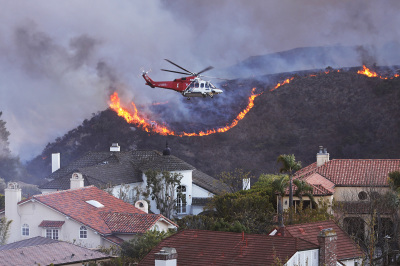As a Californian Christian, I'm asking gov't why but not God

As a California native, lifelong resident, and someone who lives relatively close to Los Angeles, it's a little hard to comprehend the “apocalyptic” and “warzone” scenes that are unfolding from the wildfires.
“Yeah, it’s ugly. It looks like a warzone, without a firefighter in sight. It’s crazy," my family members in LA tell me.
Unfortunately, tragedies are nothing new in this life. And when they happen the natural human reaction is to ask why.
I watched one news interview of a man whose house was the only one left standing in his entire neighborhood after the fire burned through. In tears, he wondered why God had spared his house and not his neighbors. That is the type of question none of us can answer in such a circumstance. But it’s also the type of lament God invites us to bring to Him. In tragedies like we see unfolding in Los Angeles, often all we can do is call on the God who sees us and cares for us.
To be honest, I’m in total shock at the magnitude of the devastation and completely heartbroken for those who've been affected by it. I’m also dumbfounded and upset at the lack of preparation and competence by those in government positions whom we pay to prepare for these things. I’m referring to the government officials and departments that are given billions of taxpayer dollars to prepare for these events to mitigate loss and damage. It is obvious that there’s been serious mismanagement and neglect in that area.
There are several preventative measures in wildfire mitigation and most of them are simply common sense. These measures include brush and deadfall clearing, creating firebreaks, and water readiness, which is maintaining fire hydrants and reservoirs with water that is ready to be used during fires.
Some of the failed fire prevention measures seem to be due, at least in part, to budget cuts. And this, in my opinion, is what is at the center of the frustration and anger coming from Californians.
Wildfires are going to happen in California, and no amount of preparation is going to stop a fire from spreading when there are 100 mph winds. But if the news reports are true, even in part, then some of the most basic fire prevention measures were totally neglected. It makes one wonder if any of the loss and damage might have been prevented with a proper fire mitigation process in place. It also begs the question what was done with all the taxpayer money earmarked for these things? Or, another logical question is why, in a state prone to wildfires, would you choose to cut the budget intended to be used for fire protection?
Besides government policy questions, tragedies also make us ask spiritual questions. I’m not going to venture any answers as to why this particular disaster has happened. I think that question delves into a realm far beyond human understanding. But I do believe the Bible offers us some insight into how we can respond when disasters do hit.
In the Book of Job, after Job had suffered catastrophic losses, his friends hear of it and go to comfort him. Their initial response was quite beautiful. It says they came to sympathize and comfort Job — they wept and mourned and even lay on the ground with him for a week without saying a word. Often words don’t need to be spoken. It’s profound how much meaning there can be in the simple presence of a friend or loved one.
Job’s friends got into trouble when they attempted to offer explanations as to why such calamity had befallen Job, speaking on God’s behalf about things that did not know about.
For those in the midst of this tragedy, I believe it is important to remember to bring our laments to God. He is “God with us.” He is not afraid of our questions or emotions. Scripture says that we can bring our sorrow and questions to God, and He will hear us. In fact, it indicates that lamenting in prayer is a Christian’s privilege. God does not reject the lament of His children.
For those who have just lost their homes or loved ones, Scripture invites us to cast our cares upon God because He cares for us. Roughly half of the Psalms have lament as a major part, telling us God is not offended by our lamentations. Lamentation offers the lamenter the opportunity to express what they truly feel. Biblical laments are directed toward God because there is an understanding of who God truly is. Ultimately, we are invited to bring our emotions to the God of compassion.
The famous missionary Hudson Taylor once said, “I am no longer anxious about anything, as I realize that He is able to carry out His will for me. It does not matter where He places me, or how. That is for Him to consider, not me, for in the easiest positions He will give me grace, and in the most difficult ones His grace is sufficient.” Lord let Your grace be felt by all those affected.
Daniel Hamlin is an author, surfer, and speaker from the Central Coast of California. Since the release of his first book in 2015 Hamlin has spoken at churches and ministries throughout the world. He also holds a degree in Biblical Studies. Find out more at www.danielhamlin.org




























